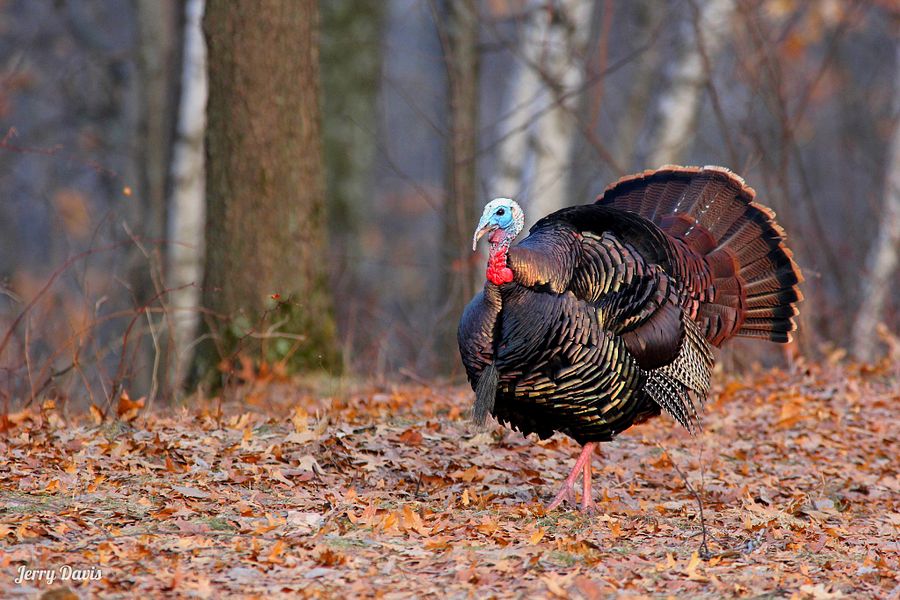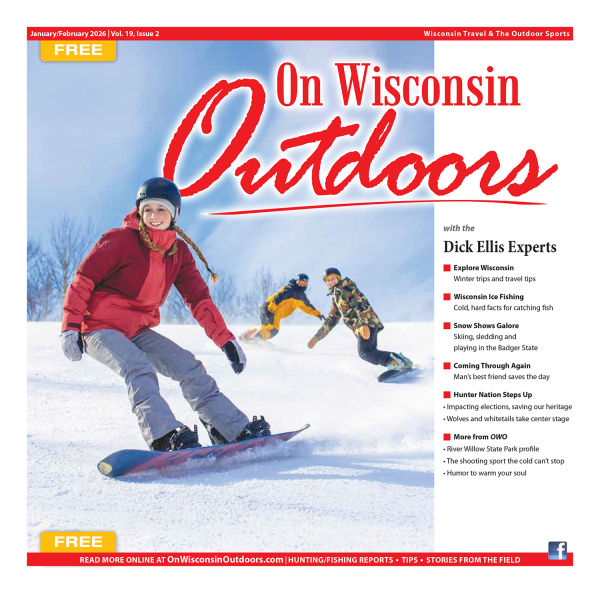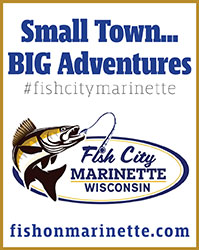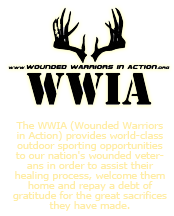DNR Weekly News Update for February 11, 2020
Weekly NewsPublished February 11, 2020
- Important Changes To 2021 Bear Season Application
- Hunters Register 3,792 Birds During 2019 Fall Turkey Hunt
- Help Improve Habitat For Wildlife
- DNR Service Center Counters and Call Center Unavailable During Staff Training
- Catastrophic Aid Request Approved For 15 Communities and Tribes
- Wild Wisconsin - Off the Record Podcast New Episodes Available Now
Important Changes To 2021 Bear Season Application
Bear Application Period Delayed
Contact(s): Matt Gross, DNR assistant big game ecologist, 608-261-7588, matthew.gross@wisconsin.gov
MADISON, Wis. - The bear application period for the 2021 bear hunting season is delayed due to legislative review. The application period which normally opens in March will open shortly after the legislative review process is complete at a date to be determined.
The 2021 bear application deadline remains Dec. 10, 2020. Applicants are reminded to be aware of the new bear management zone boundaries as their hunting grounds may change to a new unit beginning in 2021. It is not known precisely how these changes will specifically affect harvest permit wait times, but there will likely be no significant changes across zones A, B, C and D.
The Wisconsin Black Bear Management Plan 2019 - 2029 [PDF] was developed by the Wisconsin Department of Natural Resources Bear Advisory Committee and approved by the Natural Resources Board in May 2019. Among the changes are new zones [PDF] which must undergo a legislative review. The new bear management zones are designed to address bear conflicts and manage desired population levels effectively.
"Wisconsin continues to be one of the premier black bear hunting states in the nation, with ample public hunting lands and a robust bear population. As such, the extent of bear range has steadily expanded further south into the central forest and beyond," said Matt Gross, DNR assistant big game ecologist. "The new zones will allow management decisions to address both the opportunities and challenges that can arise with an expanding bear population."
If you would like to hunt black bear in Wisconsin, you must possess a Class A bear license. You may obtain a Class A bear license by:
- Being selected in the bear drawing;
- Participating in the Learn to Bear Hunt Program; or
- Receiving a Class A bear license transfer via the Awarded Permit Transfers Program or the
- Deceased Customer Preference Approval Transfer [PDF]
Applications are required for a Class A license or to receive a preference point. Hunters must apply at least once during a period of three consecutive years otherwise all previously accumulated preference points will be lost. Sign up here to receive notification of when the 2021 bear permit application opens
Wisconsin bear hunting is extremely popular, and more people apply each year than the number of licenses available. For 2020, over 119,000 hunters applied for a permit or a preference point for 11,535 available permits.
________________________
Hunters Register 3,792 Birds During 2019 Fall Turkey Hunt

A tom turkey displaying in fallPhoto credit: Jerry Davis
Contact(s): Alaina Gerrits, DNR assistant upland wildlife ecologist, 608-261-8458, Alaina.Gerrits@wisconsin.govMark Witecha, DNR upland wildlife ecologist, 608-267-7861, Mark.Witecha@wisconsin.gov
MADISON, Wis. - With another wild turkey season complete, the Wisconsin Department of Natural Resources reports hunters registered 3,792 birds during the fall 2019 wild turkey season.
There were 74,775 harvest authorizations were issued for the 2019 fall season, an increase of 860 from 2018. Of those sold in 2019, 70,084 were awarded a fall turkey license and 4,691 were sold over the counter as bonus harvest authorizations.
As in 2018, the fall turkey drawing was waived in 2019. Anyone with a fall turkey license and stamp was awarded one harvest authorization for the zone of their choice. In addition to the harvest authorization included with a fall turkey license, a total of 13,000 bonus harvest authorizations were available for purchase in zones 1-4.
With a difference of only 10 more birds registered, the fall harvest in 2019 was almost identical to 2018. There were 3,782 turkeys registered during the 2018 fall season. This season's harvest success rate was 5.1%, also equal to 2018. The success rate is calculated based on the number of harvest authorizations sold and is not corrected for non-participation.
"Although this year's fall harvest is nearly identical to 2018, over the last decade, we have seen a steady decline in the number of turkeys harvested in the fall," said Mark Witecha, DNR upland wildlife ecologist. "Reductions in harvest over the last 10 years are largely due to a decline in hunter participation and effort. The annual fall hunter survey shows continued declines in fall turkey hunter numbers and a larger portion of those hunters are pursuing turkeys secondary to other species."
The wild turkey is truly one of Wisconsin's wildlife management success stories. A key role in the success of the wild turkey management program can be attributed to hunters through their purchase of the Wild Turkey Stamp which provides vital financial support in providing for future opportunities for turkey management and hunting in Wisconsin.
Since wild turkeys were first successfully reintroduced into Wisconsin in 1976, population levels continue to increase and expand statewide. Successful restoration of the wild turkey resulted from tremendous hunter and landowner support, good survival and high-quality habitat. The DNR first initiated a fall turkey season in 1989 after an increase and expansion of turkeys throughout the state. Since then, hunters have been able to pursue turkeys during both fall and spring seasons.
________________________
Help Improve Habitat For Wildlife
Enroll In The Deer Management Assistance Program By March 1

A program cooperator with a white-tailed buck harvested on his DMAP-enrolled property.Photo credit: DNR
Contact(s): Bob Nack, DNR DMAP coordinator, 608-264-6137, Robert.Nack@wisconsin.gov
MADISON, Wis. - The Wisconsin Department of Natural Resources is looking to partner with landowners for the Deer Management Assistance Program (DMAP) designed for healthy deer and habitat.
DMAP is a cooperative effort between the Department of Natural Resources, landowners, and hunters to provide habitat and deer herd management assistance to those interested in managing their property for wildlife. Wildlife and forestry professionals assist landowners with management practices that consider the ecological and social impacts white-tailed deer have on the landscape.
In return, DMAP participants can choose to share habitat information, collect biological data and participate in DMAP workshops. This one-on-one relationship, stressing communication and cooperation, makes DMAP a flexible and effective deer management program for private and public lands alike.
Although DMAP enrollment is open year-round, landowners, hunters and land managers with properties that are 160 acres or more are encouraged to enroll before March 1 to be eligible for a site visit with a DNR biologist and forester in 2020. Landowners who enroll by March 1 will also receive a management plan with recommendations to assist with reaching the goals for the property.
DMAP provides informational resources and professional assistance regarding wildlife habitat management for properties of any size to help participants improve habitat for wildlife. DMAP participants are invited to professional workshops on a variety of topics such as:
- Financial assistance programs;
- Natural forage for deer, deer ecology and management;
- Chronic wasting disease (CWD); and
- Deer research and predator effects on the deer herd.
DMAP participants receive regular updates on items of interest to land stewards and opportunities to participate in citizen science programs. Neighboring landowners with properties within one-half mile are encouraged to enroll as a DMAP cooperative.
Landowners who enroll in a DMAP cooperative with a combined acreage of 160 acres or more are eligible to receive a site visit and management plan. DMAP cooperatives also provide an opportunity to monitor local wildlife populations and share costs and equipment on habitat projects to benefit deer and other wildlife over a greater area.
To receive DMAP email updates and other information, subscribe here. Follow the prompts and select the "Deer Management Assistance Program" option, found under Wildlife Management.
________________________
DNR Service Center Counters and Call Center Unavailable During Staff Training
Contact(s): Kimberly Currie, Customer & Outreach Services Bureau Director, 608-267-7799, Kimberly.Currie@wisconsin.gov
MADISON, Wis. - All DNR service center counters and the agency's statewide call center will close on Feb. 18-19 for staff training. During this time, other staff will continue to answer the DNR Tipline, the Emergency Spills line and the Wisconsin Emergency Management hotline.
Many services available at a DNR service center counter can also be accessed on the DNR website and GoWild.wi.gov. In addition, about 1,000 license agents throughout Wisconsin can provide boat and recreational vehicle-renewal services, trail passes and fishing and hunting licenses.
Counter services and the call center will resume normal business hours on Thurs., Feb. 20. The new 2020-21 fishing and hunting licenses go on sale starting March 1.
________________________
Catastrophic Aid Request Approved For 15 Communities and Tribes

A tree in a Wisconsin Rapids park damaged by last summer's storms.Photo credit: DNR
Contact(s): Chase O'Brien, DNR Wisconsin Urban Forestry Grants Manager, 608-640-6143, chase.obrien@wisconsin.gov
MADISON, Wis. - Fifteen Wisconsin communities will receive additional grant funding to help address damage from widespread storms last July. The Joint Committee on Finance approved the request in full, including $489,100 in funds to supplement the Urban Forestry's Catastrophic Storm Grant offering. As a result, all 15 communities will receive the total amount requested on their grant applications.
Last October, the Wisconsin Department of Natural Resources Urban Forestry program awarded 15 communities and tribes with grant funding in response to the State of Emergency declared on July 18, 2019. The storms brought torrential rains, strong winds, downed trees, damaged buildings, at least 16 tornadoes, and left thousands of people without power across a wide area of Wisconsin.
This declaration triggered the availability of up to 20% of the program's funds, an amount of $104,920, to affected Wisconsin communities to help lessen the burden of storm-related damages to their urban forest canopy.
Although each applicant was able to request a maximum of $50,000, grants were limited to awards ranging from $4,000 to $8,428.19 because of the unprecedented number of applications.
The DNR submitted a request in December to the Joint Committee on Finance to transfer funds from the forestry emergency reserve. This reserve was created in 2017 as a result of Wisconsin Act 59 for emergency responses to significant fire, disease, infestation, or other natural disasters that could not otherwise be reimbursed by federal funds.
________________________
Wild Wisconsin - Off the Record Podcast New Episodes Available Now

Nick and Emily Stetzer at Rib Mountain State Park.Photo credit: Courtesy of Nick and Emily Stetzer
Contact(s): Katie Grant, 608-266-5231, katie.grant@wisconsin.gov
MADISON, Wis. - The latest episodes of the "Wild Wisconsin - Off the Record" podcast brought to you by the Wisconsin Department of Natural Resources are available now on all major podcast platforms. Episodes highlight state park love stories, the miraculous comeback of the much-loved bald eagle, the impact of snowmobiling and ice fishing.
Wisconsin State Parks: A Love Story
There's a lot of love for Wisconsin's state parks. In honor of Valentine's Day, visitors share their Wisconsin State Park love stories about first dates, surprise engagements and scenic wedding days. Listen in to hear how their special day is something they'll remember forever.
Sled Town -- Snowmobiling in Wisconsin
Wisconsin is the birthplace of snowmobiling and continues to offer some of the best snowmobiling opportunities you are likely to find, especially in the northern part of the state. Eagle River is the Snowmobile Capital of the World and host of the Amsoil World Championship Snowmobile Derby. On this episode, Kim Emerson, Executive Director of the Eagle River Area Chamber of Commerce & Visitors Center, sheds light on the mecca of snowmobiling. With more than 200,000 registered snowmobiles hitting Wisconsin's 25,000 miles of groomed trails each winter across the state, safety is an important part of the ride. DNR Warden April Dombrowski has tips on how to ride smart from the start. Listen in and discover why Wisconsin is where it's at when it comes to snowmobiling.
Ice fishing is a favorite pastime for many Wisconsinites, who have fond memories of going out on frozen lakes with their families when they were young. If you drive past any Wisconsin lake in the middle of winter after its iced over, you'll almost certainly see at least one person out ice fishing. On this bonus episode of Wild Wisconsin, "Spending Time On The Ice," Bill Scott talks with See Yang about the appeals of ice fishing -- it's tougher to predict than open water fishing, and there's always something new to learn.
Wild Wisconsin: Off The Record brings you inside voices on Wisconsin's outdoors. It doesn't matter if you live to hunt and fish, watch birds, love camping, or you're someone who likes to get outdoors for a walk every once in a while - there's something here for everyone. Have a podcast idea or want to subscribe for updates, visit us here.
________________________
Read more: Previous Weekly News











